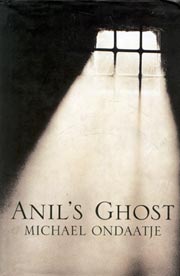
Anil’s Ghost, by Michael Ondaatje, Read by Alan Cumming, Random House AudioBooks, 2000
There is almost no war worse than civil war. Brother turned against brother, neighbor against neighbor, the friendly face that turns out to belong to your foe. There is something especially horrific when the killing blow comes from within when all along we are wired to fear what is outside.
The Booker Prize winner Michael Ondaatje has followed his third celebrated novel, The English Patient, with a tale set in 1980s Sri Lanka during that nation’s clashing sectarian years. The island country was then ripped apart by government killing squads, murderous anti-government rebels, and violent separatists who sought to create an independent state in the north. With three competing factions, one had to be suspicious of simply everyone.
You feel while reading Anil’s Ghost that it is more personal for the author than previous ones due to Ondaatje’s being born in Sri Lanka, living there when it was a dominion of the British and was named Ceylon, then moving away in his teens. There is a way your childhood home captures you, shapes your character down through all the succeeding years.
Ondaatje’s novel, published in 2000, before our present age of the unending long war on terror, effortlessly captures the dominant global paranoias and presages the current world situation. As one character, conspiring with another, notes, “You’re six hours from Columbo and you’re whispering.”
The Anil of the title is not in fact a dead woman; the ghost is not hers in the existential sense but in a possessive one. Anil Tessira works as a forensic pathologist for the U.N. and has come to investigate reports of mass murders for the human rights commission. A native Sri Lankan, Anil left when she was only eighteen, but her return illustrates a kind of small community feeling prevalent. Once a famed swimmer in her native country, Anil is constantly being recognized by others for this, though it happened over fifteen years ago.
Nominally cooperating with the United Nations, the Sri Lankan government has assigned Anil a minder/partner in archeologist Sarath Diyasena. When Anil discovers a relatively fresh skeleton among the bones at a government protected archeological dig, she and Sarath set out to track down the missing man, identify him, and file an official report calling for censure of the government. They are joined in this quest by Sarath’s brother Gamini, an emergency room doctor.
In any film adaptation of this kind of book or in any typical road story of this type, Anil and Sarath would find themselves irresistibly drawn to each other, unable to deny their passions even as the forces of darkness close in on them. I’m happy to say that Ondaatje avoids this kind of trite character development, instead focusing on how each individual characters’ motivations and complexities lead them into multi-layered misunderstandings and conflicts. Their troubled and uneasy alliances are a slight reflection of the political situation at the time, forces at war and at rest between battles.
The novel is fragmentary at times, telling small portions of much larger stories, allowing us to see the characters in the moment of the book then much later flashing back to a shaping influence, a wrenching experience, which deepens our understanding. Then, also there are strange little nightmare scenes like when Anil and Sarath are driving back from visiting his teacher who lives out in the country and come across a truck driver, lying on the ground in front of his vehicle, his hands nailed to the road.
What’s compelling is how Anil and Sarath strive to find out the identity of one single body despite how many more bodies there are piling up daily. In a country riven in three, the quantity of enemies being eliminated was high and frightening and constant. Yet, against the odds, regardless of reprisals, they move through the nation, not to be shaken from their search. They are both haunted by the man’s name, the identity of the body they have chosen to call Sailor, as they drag his bones from one end of the island to the other.
The novel ends as it can only possibly conclude, dishearteningly, though not without promise. Sarath’s character takes on almost mythic dimensions in the closing chapters, his particular sacrifices and the build-up to them carrying all the high dramatic tension of the best thrillers, while his actions remain mysterious until the very end.
Ondaatje writes with such a commandingly tight prose here that despite often changing character focus rather abruptly, there was never any confusion regarding which of the many characters had stepped into the spotlight. The personalities are etched as if in acid, the kind of jagged portraits war carves out of human pity, human frailty, human aspirations, and human monstrousness. They call into question their own existences as though flesh and blood incarnations for whom the author is merely a transcriptionist. That is a humbling feat to experience; that is art.
Reader Alan Cumming is possessed of a fine, smooth British tone that is at once authoritative and melodious. Either he or his producer almost completely sabotages the performance by low volume murmuring and recording levels so subterranean that even with the volume maxed out, I often had to stop and press a hand to my head just to hear, just to catch that one telling phrase, that one luminous moment.
No comments:
Post a Comment